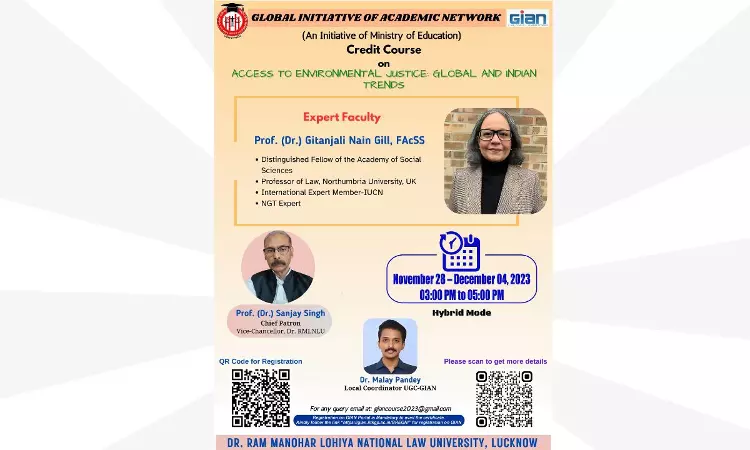UGC-GIAN: Credit Course On Access To Environmental Justice: Global And Indian Trends
LIVELAW NEWS NETWORK
1 Nov 2023 10:58 AM IST

Union Cabinet has approved a program titled Global Initiative for Academic Networks (UGC-GIAN) in Higher Education aimed at tapping the talent pool of scientists and entrepreneurs internationally to encourage their engagement with the institutes of Higher Education in India so as to augment the country's existing academic resources, accelerate the pace of quality reform, and elevate India's scientific and technological capacity to global excellence. UGC-GIAN is envisaged to catalyse higher education institutions in the country, and that it will initially include all IITs, IIMs, Central Universities, IISc Bangalore, IISERs, NITs and IIITs subsequently cover good State Universities where the spinoff is vast. UGC-GIAN is an evolving scheme which will initially include participation of foreign faculty in Institutes as Distinguished / Adjunct / Visiting faculty / Professors of Practice, etc., to participate in delivering Short or Semester-long Courses. Other activities will be included in due course.
THE PROPOSED UGC-GIAN IS ENVISAGED TO ACHIEVE THE FOLLOWING OBJECTIVES:
- To increase the footfalls of reputed international faculty in the Indian academic institutes.
- Provide opportunity to our faculty to learn and share knowledge and teaching skills in cutting edge areas.
- To provide opportunity to our students to seek knowledge and experience from reputed International faculty.
- To create avenue for possible collaborative research with the international faculty
- To increase participation and presence of international students in the academic Institutes.
- Opportunity for the students of different Institutes/Universities to interact and learn subjects in niche areas through collaborative learning process.
- Provide opportunity for the technical persons from Indian Industry to improve understandings and update their knowledge in relevant areas.
- Motivate the best international experts in the world to work on problems related to India.
- Develop high quality course material in niche areas, both through video and print that can be used by a larger body of students and teachers.
- To document and develop new pedagogic methods in emerging topics of national and international interest.
1 Credit Course: Global Initiative of Academic Network (UGC-GIAN) (An Initiative of Ministry of Education)
Topic: ACCESS TO ENVIRONMENTAL JUSTICE: GLOBAL AND INDIAN TRENDS
Duration: November 28 – December 04, 2023 (7 days)
OVERVIEW
A broad understanding of environmental justice involves participation in environmental controversies. Participatory mechanisms can help to meliorate issues of inequality, recognition and the larger question of capabilities and functioning of individuals and communities. The discourse and understanding of environmental justice has broadened to include issues of fairness, equity, standing, rights of disadvantaged populations in developing countries and meaningful participation in the decision-making process to promote environmental governance. This course focuses on a strong procedural dimension that reflect fair, open, informed and inclusive state institutional processes.
In this context, access to justice through an accessible judicial mechanism to redress environmental damage or harm and the protection and enforcement of legitimate interests becomes important. The importance of judicial institutions [courts and specialist tribunals to adjudicate environmental disputes] is widely acknowledged in international instruments. Specialized judicial forums in environmental matters provide a legitimate forum that help access environmental justice by their substantive decisions that protects constitutional, statutory and human rights, and flexible procedural requirements. Presently, there are over 1200 ECTs operating in 44 countries, worldwide, sited in every major type of legal system (civil law, common law, mixed law, Asian law and Islamic law), at all government levels, from the richest to the poorest nations, with the majority created in the previous 10 years. In this context, India's commitment to secure environmental justice assumes significant practical importance. This course traces and evaluates the role of Indian judiciary (Supreme Court of India and the National Green Tribunal) in contributing and promoting access to environmental justice and governance.
Modules:
|
Who can Attend:
|
Fees:
|
Objectives
The primary objectives of the course are as follows:
- To undertake systematic and legal analysis of Environmental Justice issues at the International and National Level.
- To evaluate the effectiveness of judicial structures, with emphasis on comparative perspective, and identify the factors contributing to disparities in environmental outcomes.
- Develop an in-depth understanding and knowledge of environmental justice discourse and identify factors that contribute to the existence of disparities in environmental outcomes;
- Develop the ability to analyse and articulate the importance, growth and varied operational strategies of the specialised courts and tribunals to provide access to environmental justice from an international and comparative perspective;
- Analyse and evaluate the effectiveness of the judicial structures, with special reference to the National Green Tribunal in dispensing environmental justice and formulating legal responses in India; and
- Ability to undertake systematic and high quality legal analysis in environmental justice issues at international and national level.
Course Details
Module 1 – Conceptualising Environmental Justice and its Changing Paradigm
Introduction to the concept of environmental justice
Theoretical foundations (Chavis, Agyeman, Shrader-Frechette, Young, Honneth, Scholsberg, Sen and Naussbaum)
Environmental justice with its shifting meaning- developed and developing countries
International and regional developments to promote access to environmental justice with emphasis on procedural dimensions
Module 2 - Specialised Environmental Courts and Tribunals: A Global Perspective
Role of judiciary for environmental compliance and enforcement
The need for specialised environmental courts and tribunals at the global level
Examples of specialised environmental courts and tribunals from developed (Australia, New Zealand, Sweden, UK) and developing (Malaysia, Kenya and SAARC countries)
Module 3 - The National Green Tribunal of India: Accessing Environmental Justice
Genesis and establishment of the National Green Tribunal (India)
The National Green Tribunal Act 2010: interpretation and Application National Green Tribunal and Principles of International Law
Science and Scientific expertise in the national Green Tribunal An assessment of the National Green Tribunal
Teaching Faculty with allotment of Lectures and Tutorials
Expert Faculty - Prof. Gitanjali Nain Gill, FAcSS
- 8 Hours lectures and 4 Hours tutorials
Host Faculty - Dr. Atul Kumar Tiwari
- 2 Hours lectures and 1 Hour tutorial


